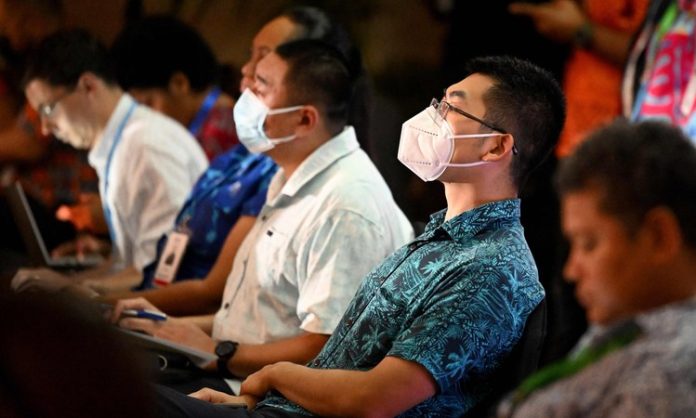Two Chinese defence attaches have been kicked out by Fijian police from a Pacific Islands Forum meeting at which the US vice-president, Kamala Harris, was giving a virtual address.
The men were sitting in on a session of the Forum’s fisheries agency at which Harris announced the step-up of U.S engagement in the region, believed to be in response to China’s growing influence.
They were sitting with the media contingent, but one was identified as a Chinese embassy official by Lice Movono, a Fijian journalist who is covering the Forum for the Guardian.
Movono said she “recognised him because I’ve interacted with him at least three times already”, including during the visit of the Chinese foreign minister, Wang Yi, to Suva last month, at which journalists were removed from events and blocked from asking questions.
“He was one of the people that was removing us from places and directing other people to remove us,” she said. “So I went over to him and asked: ‘are you here as a Chinese embassy official or for Xinhua [Chinese news agency], because this is the media space. And he shook his head as if to indicate that he didn’t speak English.”
Movono alerted Fijian protocol officers, who told her to inform Fijian police, who then escorted the two men from the room. They did not answer questions from media.
Diplomatic sources later confirmed that the men were a defence attache and a deputy defence attache from China, and part of the embassy in Fiji.
The incident comes after an intensification of Chinese involvement in the region in the last few months, which is simmering as an undercurrent to the year’s Pacific Islands Forum.
The uptick of tempo of China’s involvement has included China’s signing of a controversial and wide-ranging security pact with Solomon Islands and a marathon tour of the Pacific region by the Chinese foreign minister at which more than 50 agreements were believed to have been signed.
China is not a part of the Pacific Islands Forum, but like the U.S is a partner country. Partner nations are usually invited to attend a post-forum dialogue meeting, at which they can give presentations, but this year the partner dialogue will not be held during the week of the summit, in order to give Pacific countries some breathing room from the intense geopolitical pressure.
It was believed China would use the post-Forum dialogue meeting to reintroduce a new version of the sweeping economic and security deal that it presented to 10 Pacific leaders last month, but which was rejected.
However, Harris was invited to attend the Forum virtually, in what is seen as a huge coup for the U.S and a blow to China, which has been not afforded a similar honour.
The U.S has made a concerted effort to step up its engagement with the Pacific in light of Chinese interest, including by reopening its embassy in Solomon Islands, which was announced in February, plus a suite of measures announced by Harris on Wednesday.
These measures include two new embassies, the appointment of a special presidential envoy to the Pacific Islands Forum and tripling the amount of money requested from the US Congress for economic development and ocean resilience – up to US$60m a year for 10 years – as well as a return of Peace Corps volunteers to Fiji, Tonga, Samoa and Vanuatu.
Fiji’s prime minister, Frank Bainimarama, acknowledged the .US’s reengagement with the region, saying: “It is clear the U.S is certainly looking a lot more like the Pacific partner we have traditionally held it to be.”
In her virtual address to Pacific leaders on Wednesday morning, Harris acknowledged the diplomatic void that the U.S had left in recent years, saying: “We recognise that in recent years, the Pacific islands may not have received the diplomatic attention and support that you deserve. So today I am here to tell you directly: we are going to change that.”
She also appeared to take a swipe at China’s involvement in the Pacific, speaking of “bad actors” in the region.
“At a time when we see bad actors seeking to undermine the rules-based order, we must stand united,” Harris said. “In this region and around the world, the United States believes it is important to strengthen the international rules-based order – to defend it, to promote it and to build on it.
“These international rules and norms have brought peace and stability to the Pacific for more than 75 years – principles that importantly state that the sovereignty and territorial integrity of all states must be respected; principles that allow all states, big and small, to conduct their affairs free from aggression or coercion.”…PACNEWS
SOURCE: THE GUARDIAN/PACNEWS













